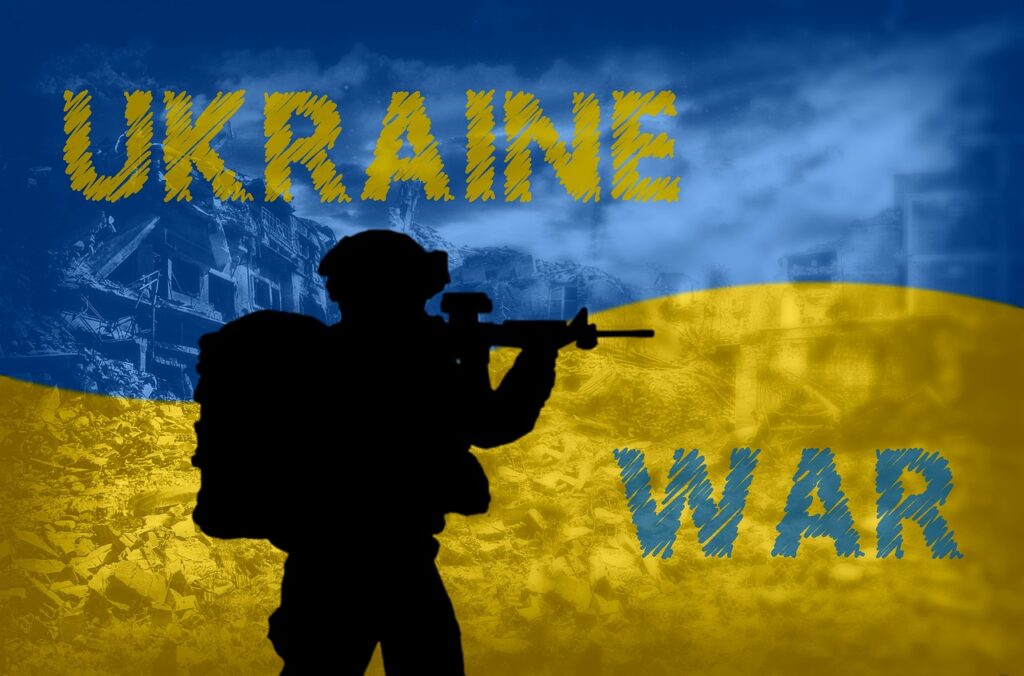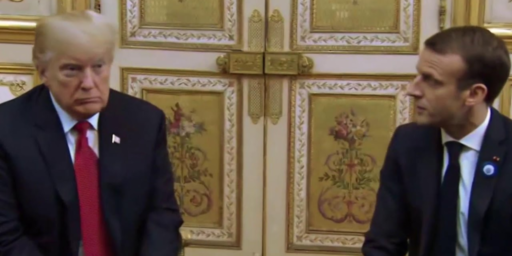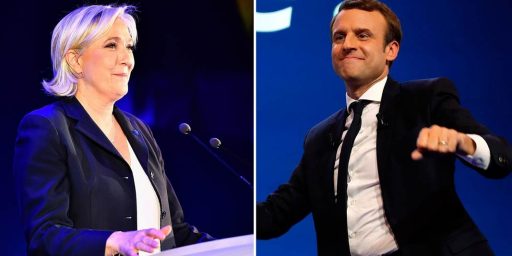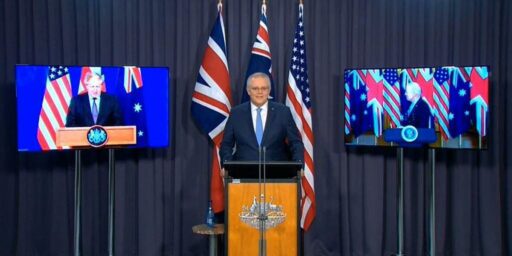NATO Sending Mixed Signals to Ukraine and Russia
Alliance leaders have significantly different priorities regarding the conflict.

WSJ (“NATO’s Biggest European Members Float Defense Pact With Ukraine“):
Germany, France and Britain see stronger ties between NATO and Ukraine as a way to encourage Kyiv to start peace talks with Russia later this year, officials from the three governments said, as some of Kyiv’s Western partners have growing doubts over its ability to reconquer all its territory.
U.K. Prime Minister Rishi Sunak last week laid out a blueprint for an agreement to give Ukraine much broader access to advanced military equipment, weapons and ammunition to defend itself once the war ends. He said the plan should be on the agenda for the North Atlantic Treaty Organization’s annual meeting in July.
A year into the war, Paris and Berlin also support the initiative and all three governments see it as a way to boost Ukrainian confidence and give the government there an incentive to start talks with Russia, the French, German and British officials said.
The officials were careful to say that any decision on when and under what conditions any peace talks start is entirely up to Ukraine. Mr. Sunak on Friday said the West should give Ukraine arms that would give it a “decisive advantage” on the battlefield, including warplanes.
But the public rhetoric masks deepening private doubts among politicians in the U.K., France and Germany that Ukraine will be able to expel the Russians from eastern Ukraine and Crimea, which Russia has controlled since 2014, and a belief that the West can only help sustain the war effort for so long, especially if the conflict settles into a stalemate, officials from the three countries say.
“We keep repeating that Russia mustn’t win, but what does that mean? If the war goes on for long enough with this intensity, Ukraine’s losses will become unbearable,” a senior French official said. “And no one believes they will be able to retrieve Crimea.”
Such talk contrasts sharply with public comments this week by President Biden and other Western leaders, who called for unity to counter what they termed Russian aggression. None mentioned the prospect of Kyiv opening talks with Moscow in the near future.
In a fiery speech in Warsaw, Mr. Biden sought to rally the West, saying: “Appetites of the autocrat cannot be appeased; they must be opposed.”
An alliance is only as strong as its weakest link—and that’s especially true for a consensus-based one like NATO. There is unity in outrage over Putin’s aggression and war crimes but considerable gaps in appetite for sustaining massive support over a long enough timespan to achieve maximalist goals.
The status quo ante would have been an acceptable outcome months ago but the sheer brutality of the invasion has made anything short of a complete rejection of Russian forces from Ukraine’s pre-2014 borders unacceptable for Ukraine. The Biden administration, crucially including the President himself, seems on board with that war aim.
It’s not clear that any of the other key allies are there; indeed, France’s Emmanuel has been trying to negotiate an appeasement since the early days of the conflict. Sunak and Germany’s Olaf Scholz are still finding their footing as leaders.
U.S. officials declined to comment on the proposed NATO security pact. Washington has said it wants Ukraine to be sufficiently armed after the war to deter any future Russian attack.
The German government declined to comment. Spokespeople for the British and French governments didn’t immediately respond to requests for comment.
President Emmanuel Macron of France and Chancellor Olaf Scholz of Germany told Ukrainian President Volodymyr Zelensky that he needed to start considering peace talks with Moscow when the three leaders met in Paris earlier this month, people familiar with the conversation said.
Over dinner at the Élysée Palace, the sumptuous seat of the French presidency, Mr. Macron delivered a more sober message, the people said, telling Mr. Zelensky that even mortal enemies like France and Germany had to make peace after World War II.
Making peace in Europe after World War II was relatively simple: the Allies achieved the unconditional surrender of Germany. That is quite unlikely for either side in this conflict. Indeed, Macron seems to grasp that:
Mr. Macron told Mr. Zelensky that he had been a great war leader, but that he would eventually have to shift into political statesmanship and make difficult decisions, these people said.
Speaking after a security conference in Munich last weekend, Mr. Macron became one of the first Western leaders to publicly question whether either Ukraine or Russia could achieve their battlefield aims, saying neither side could prevail militarily.
He told French media: “What we need now is for Ukraine to launch a military offensive which pushes back the Russian front in order to open the way for a return to negotiations.”
As I’ve been saying for months, I don’t know how we get there.
Putin’s reputation, position of power, and quite possibly his very survival hinges on a face-saving outcome to this conflict. He’s lost as many as 200,000 soldiers but this is a country that lost 20 million in WWII. He can likely sustain the fight for quite some time. Meanwhile, the Ukrainian government claims that more than 100,000 Ukrainian civilians have been killed in the year since the invasion and estimates have the number of military casualties over 120,000. Absent utter defeat of one side by the other, a negotiated settlement seems impossible.
Some seem to think exhaustion will set in before much longer.
A British official said another goal of the NATO pact would be to change the Kremlin’s calculus. If Moscow sees that the West is prepared to scale up its military assistance and commitments to Ukraine over time, it could help persuade Moscow that it can’t achieve its military objectives.
Gen. Petr Pavel, president-elect of the Czech Republic and a former NATO commander, said at the Munich conference: “We may end up in a situation where liberating some parts of Ukrainian territory may deliver more loss of lives than will be bearable by society…There might be a point when Ukrainians can start thinking about another outcome.”
Honestly, unless there are massive number of foreign peacekeepers included as part of the settlement, I’m increasingly pessimistic that even a negotiated settlement will bring peace. Any Russian personnel still stationed in Ukrainian territory will be subject to terrorist or guerrilla attack. Indeed, I fear that even civilians deemed to be pro-Russia will be unsafe.
Regardless, there seems to be no consensus among core allies.
France and Germany have signaled that they won’t be delivering new types of weapons to Ukraine as the fighting continues in the coming weeks. And while Britain is training Ukrainian pilots on jet fighters, officials say this is part of the longer-term objective to deter Russia from future attacks.
U.S. Secretary of State Antony Blinken, also speaking in Munich last week, said that the war must end in what he called a durable peace. He said “that means making sure that Ukraine has the capacity to deter aggression and, if necessary, to effectively defend against it.”
“We have to be thinking—and we are—about what the postwar future looks like to ensure that we have security and stability for Ukrainians and security and stability in Europe,” he added.
In theory, any NATO member could veto the proposal from the U.K., France and Germany, but the organization operates on consensus and such an initiative wouldn’t even be discussed at a summit without enjoying widespread support in the alliance.
The offer falls short of the full membership in NATO that Ukraine has applied for. Still, a more limited agreement could be a step in the right direction as long as it is part of a process that should at some point in the future end in a membership, said Andriy Melnyk, Ukraine’s deputy foreign minister.
“We would like to have security guarantees on the path to NATO,” Mr. Zelensky said in a press conference on Friday.
The pact being floated wouldn’t include any commitment to station NATO forces in Ukraine, the three countries’ officials said. Neither would it offer Kyiv so-called Article 5 protection, which requires all members to come to another’s rescue if it is attacked and requests assistance. But they said it would provide Ukraine with the military means to deter any future Russian attack.
NATO promised Ukraine (and Georgia) eventual membership at the 2008 Bucharest Summit. But that was a compromise solution between a US administration that was enthusiastic about their admission and German and French administrations who adamantly opposed it. It’s not obvious that the appetite has increased but, honestly, I don’t know how a settlement is possible without admitting Ukraine.
Yes, that’s a poke in Putin’s eye that feeds his narrative that NATO is Russia’s enemy. But extending Article 5’s guarantee is the most obvious way to deter another Russian invasion.
Again, others have other ideas:
While the exact terms aren’t fixed, several of these officials said Ukraine could get access to a broad array of NATO standard weapon systems and integrate its armed forces more tightly into the Western defense industry supply chain. Germany has already indicated willingness to supply specific aid on a permanent basis, including aerial defenses, heavy artillery, tanks and ammunition. Britain has talked about supplying warplanes. Alongside that, the officials say, individual members would continue to provide bilateral military assistance to Ukraine.
“The NATO summit must produce a clear offer to Ukraine, also to give Zelensky a political win that he can present at home as an incentive for negotiations,” the British official said. “Russia’s wars have a tendency to freeze and then unfreeze, and that is why Ukraine will need more guarantees from us.”
While London, Paris and Berlin see the possibility that Kyiv may have to seek talks with Russia after an expected counteroffensive this spring that could help it regain more territory, other Ukraine backers think there should be no negotiations as long as Russian troops remain on Ukrainian soil. Many point out that Mr. Putin has shown no sign of being willing to discuss peace in good faith.
Most Central and Eastern European governments fear that encouraging Ukraine to negotiate before either Moscow or Kyiv are ready could embolden Russia by suggesting dwindling Western support. Those governments believe Mr. Putin is still committed to his original wartime goal of taking Ukraine’s capital and toppling its government.
At the same time, NATO’s eastern members don’t want to appear as an obstacle to peace talks. Poland, the Czech Republic and the Baltic states have thrown their support behind Mr. Zelensky’s plans to end the war, a ten-point proposal that includes financial compensation, war-crime trials for Russian officials, and respect for Ukraine’s territorial integrity.
The London-Paris-Berlin proposal represents one potential set of security assurances that could allow Ukraine to feel confident Russia wouldn’t use a cease-fire as a pause before launching a renewed invasion.
On Friday evening, leaders from the Group of Seven nations, which include France, the U.K. and Germany, said in a statement they are prepared to make “security and other commitments to help Ukraine defend itself, secure its free and democratic future and deter future Russian aggression.”
So far, Central European officials said, the proposal has only been discussed on the margins but they are broadly reluctant to sign off on any long-term NATO status for Ukraine that falls short of full membership in the alliance.
A Russian pledge to respect Ukraine’s territorial integrity wouldn’t be worth the paper it’s written on. Promises from NATO are more bankable but, absent membership, are still subject to the whims of future governments and changing political winds. Ukraine has never been a top priority of Western officials and sympathy inspired by the present invasion will fade.






Some sort of ceasefire is inevitable, but the combatants aren’t there yet. A writer in an Op Ed at the NYT’s suggested that an eventual peace will look like the winding down of hostilities in Korea. Given the length of what that border would be, it is unlikely that it could occur. Of course Russia may try an build a Berlin-style wall.
Ukraine might agree to a deal that included having the the populace on the Russian side of the front choose, which country they want to be part of, but Putin would never agree to that. Until one or both are exhausted, fighting will continue.
Notice that these three, even though they are major powers, are not on the front lines like Poland, Estonia, Slovakia, etc. They have their buffer.
There will be a bloodbath, a real Night of the Long Knives, after this is over.
Exactly right. I don’t see an endpoint either. But that doesn’t mean its absence should force a solution before its time.
The US is engaged in the Strategy That Dare Not Speak Its Name: we are using this war as a means to gut Russia as a military and economic power. We can’t say that publicly because it’ll sound like we are fighting to the last Ukrainian. Which is exactly what we’re doing. And I personally support that. Biden can’t say it, Blinken can’t say it, but I can say it because I am not 1) a world leader or even, 2) a diplomat, I’m 3) a kidlit writer in a blog comment section.
It’s very hard to reach consensus around a goal you cannot admit to. It was Ulysses Grant who clarified our goal in the Civil War. Not Lincoln’s kumbaya ‘preserve the union’, but unconditional surrender. See also: WW2. We have not had a lot of recent conflicts where the US could state its true goals. We don’t have a population sufficiently sophisticated to accept ruthless power games. Everything has to be dressed up as a moral crusade, and I don’t deny that liberty and all that are a real part of our FP. But the core of the game is increasing US power and if that means fighting to the last Ukrainian, we are prepared to do that since it is a real improvement for us over fighting to the last American.
The French know what’s up and they’ll push back because Macron wants a European army, and a new assertion of US hegemony is not a French goal. (He says with comic understatement.) And certainly the French are never going to be unambiguously thrilled to see Germany re-arming, or Poland moving into a military leadership role in Europe, a role the French think should be theirs. The UK plays along happily with the US because now more than ever, we’re their only friend.
Watching the Ukrainians kill Russians and make a mockery of their military is swell sport for us – and our arms industry. This is effectively what we did in both world wars: the US, at a fairly limited cost in men, managed to turn a profit on both wars, and now we’re doing the same.
Ponder the following:
At some point in WWII, the nazis had been driven out of France, Belgium, the Netherlands, Poland, etc., though the nazi regime still stood inside Germany. Had the allies not pursued a policy of unconditional surrender, the war could have ended then (in Europe, at least).
There would have been many reasons to end it then. A lot of people died bringing the nazis down, and those deaths could have been prevented. what the postwar situation would have been with Germany left standing, what kind of peace could have been made, etc., make for fascinating speculation.
But consider the prospect of a Soviet block, a Western block, and a nazi block, all armed with nukes and ICBMs.
For Ukraine at this moment in history, a policy of sweeping the Russians out seems like the best course of action. the question is whether they can do that or not. Definitely not without continuing support from her Western allies. This moves the question back to: what is the policy of the US, the UK, NATO, and the EU as regards Ukraine and Russia?
We should begin to answer it by accepting there’s no cheap course of action. Either an open-ended commitment to Ukraine until it can win decisively, a peace that leaves Ukraine open to renewed Russian aggression, or giving up Ukraine to the Russians, all of these will be massively expensive.
On the other hand, the first two cost the West only money. Ukraine is paying the bill in blood.
Seen that way, the West has a tremendous bargain.
@Michael Reynolds:
I don’t think that’s our only goal but we certainly wouldn’t be spending $80 billion a year or so supporting the Ukrainians if it wasn’t also a de facto proxy war against Russia.
The critical thing for external guarantees to some circles in Paris and London are probably thoughts of making possible a peace deal involving Russia retaining Crimea.
Without a secured settlement, a Russian controlled Crimea is a knife at the throat of Ukraine.
If it perhaps demilitarised, guaranteed, and perhaps fudged by some sort of new referendum under international auspices, then Ukraine might just be able to accept it being retained by Russia.
The problem is, that Russia is now so far hone into a war-government model, that Putin is probably safe as long as the war grinds on. Without a clear win for him, peace might seem more politically threatening to Putin and to the siloviki core of state control.
@JohnSF:
Fairly easy to climb on the tiger; the dismount can be a bit tricky.
@Michael Reynolds:
Very true; but on one thing you are a bit off: the French/Polish military alignment is actually pretty good. And Paris is increasingly annoyed with Berlin promising a “European pillar” then shuffling sideways. Again.
Poland is at least putting it’s money where mouth is: defence expenditure now at 4%; probably going 5% in 2024.
Army to increase to 250K professional soldiers, and has effectively (complicated!) reintroduced conscription. Ordered weapons currently at $85bn.
France is also ramping.
Germany, however, after big words, has seen the Scholz faction engineer a backing away from actual defence commitments.
You misunderstand the French a bit IMO.
They wish to be among the leaders of Europe; but are willing to accept partners. They don’t want a partner who will just defer, automatically, to DC. Because they don’t trust the US. Which is not an irrational position. See Trump.
If my read is correct, they are currently calculating how best to arrange a Paris/Warsaw/Madrid/Rome/Stockholm consensus and leave Berlin to it’s own boring angst, until other German interests give the SPD “Niedersachsen Network” (and CDU Merkel consensus, for that matter) the boot.